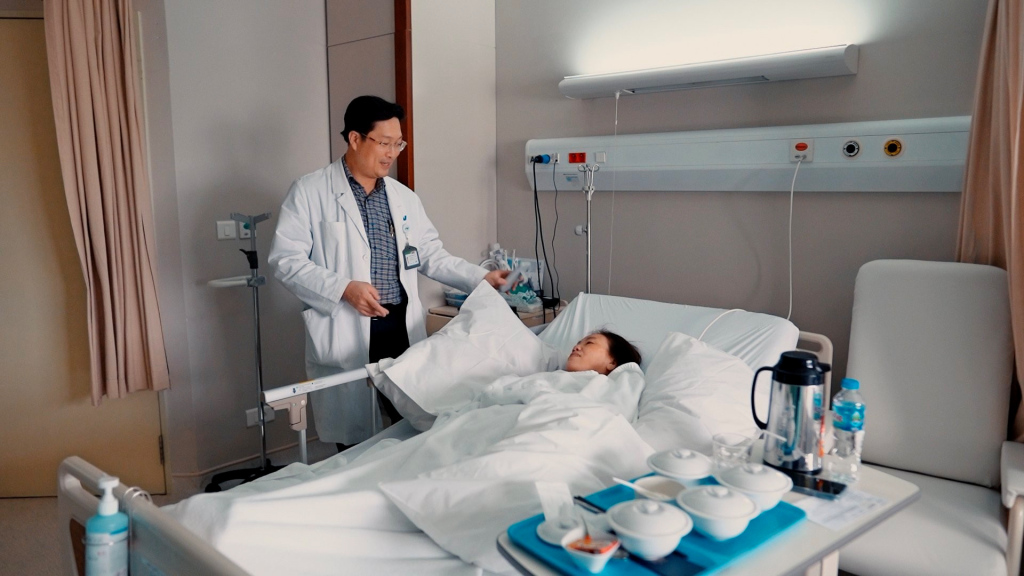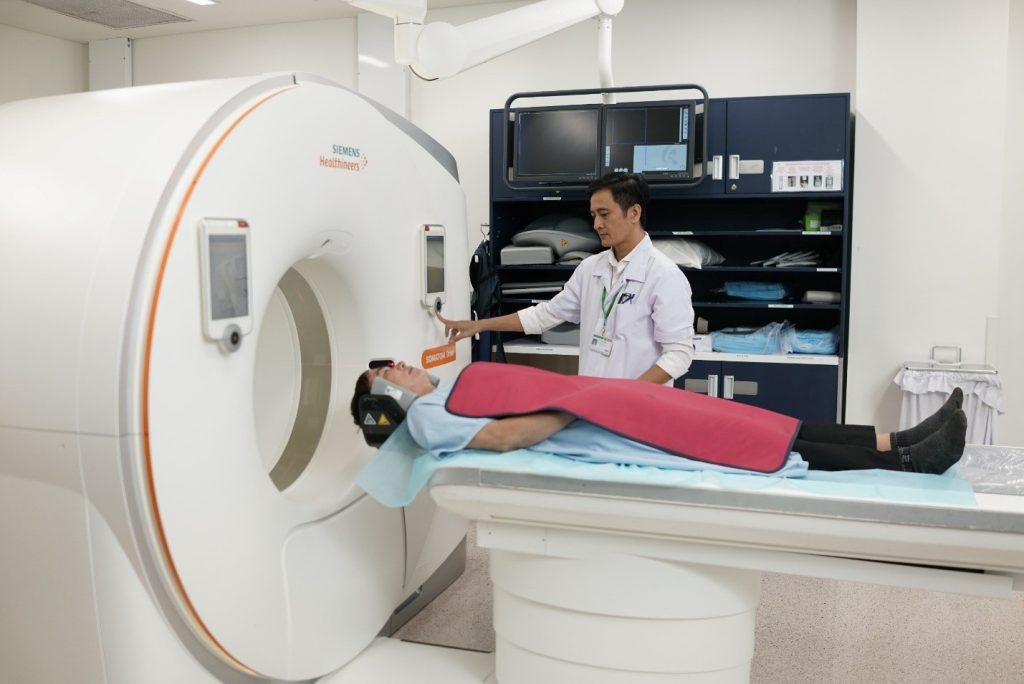With elusive symptoms such as numbness, weakness in limbs, headaches, and dizziness, syringomyelia progresses silently and can lead to disability, and in severe cases even threaten a patient’s life. However, this condition is often confused with other joint pain disorders, making detection and treatment challenging.

A surgery to treat syringomyelia enables a patient to escape a decade of relying on painkillers
A decade ago, Ms Thu Linh (50 years old, Ho Chi Minh City) experienced discomfort and difficulty when moving her left arm, accompanied by occasional spasms. The symptoms progressively worsened, causing dizziness when she tilted her head back or rotated her neck. After extended movements, her whole body would become sweaty and ache as if “beaten up.”
Ms Linh sought medical attention as her discomfort increased and was diagnosed with cervical syringomyelia at several major hospitals in Ho Chi Minh City. Syringomyelia is a condition where the central canal of the spinal cord develops cysts filled with fluid. As these cysts grow, they can compress the nerve fibres connecting to different parts of the brain, causing pain, difficulty in movement, sensory disturbances, and other symptoms.
However, the hospitals Ms Linh visited said surgery was not suitable, citing low success rates. Instead, she was prescribed pain-relieving medications to manage her symptoms for a lifetime. Unfortunately, the disease did not improve and continued to worsen. “The illness greatly affects my daily activities, especially during sleep. Even when standing, I feel restless, uncomfortable, my hand trembles, and I can hardly hold anything heavy. Over time, my hand loses sensation. Sometimes, while eating, I just want to throw away the chopsticks and use my hand to eat faster,” Ms Linh recounted. Desperate, she was referred to FV Hospital.

On arriving at FV Hospital, doctors noted Thu Linh’s motor functions were badly impacted. Advanced imaging revealed that the patient’s congenital cerebellum was longer than normal. This surplus part flowed down, occupying the centre of the grey matter containing cerebrospinal fluid. The accumulated cerebrospinal fluid couldn’t circulate properly, gradually building up, compressing the nervous system connecting the brain to other parts of the body and causing spinal cord damage.
To treat this condition, Dr Nguyen Manh Hung, Head of the Neurosurgery and Endovascular Neurosurgery Department at FV Hospital, identified the need to address two issues. The first was to decompress the compressed nerve area by widening the nerve canal. The second was to redirect the blocked cerebrospinal fluid flow. Thus, only surgery could help partially restore the patient’s function.
“As soon as the patient and her family heard the explanation of the treatment plan, they agreed immediately… Previously, almost all doctors everywhere had affirmed that the patient had to accept living with the disease for a lifetime, while the condition worsened without any treatment options,” shares Dr Hung.
Postoperative results exceeded Dr Hung’s expectations. Within five days, Ms Linh felt better. Her symptoms — headaches, dizziness, and numbness in the limbs — disappeared completely. After one week, she could walk and move normally and was moved to tears when the staff informed her that she could be discharged.

“Dr Hung evaluated my recovery positively. I am very grateful to Dr Hung as well as the nurses and physical therapists for their enthusiasm and dedication in helping me escape from the situation of having to take medication for over a decade. Everything at FV — from the services to the team of doctors and nurses — is perfect,” Ms Linh joyfully shares.
Syringomyelia: A Dangerous Disease with Vague Symptoms, Easily Confused with Neck and Shoulder Pain.
Syringomyelia is a rare disease with an incidence rate of around eight cases per 100,000 people. FV Hospital records and treats approximately four cases every year.
The cause of syringomyelia in most patients cannot be determined. Others have underlying causes such as congenital spinal defects, post-traumatic injuries, coordination with hydrocephalus, cervical myelomeningocele, lumbar spinal cord inflammation, syringomyelia cysts, and large chamber tumours.
The danger lies in the disease having vague symptoms, easily confused with general fatigue and weakness. As a result, patients often have to visit multiple specialists. By the time the correct diagnosis is made, the disease has progressed, leading to a challenging and prolonged treatment process. “This is a medical condition where even professionals can easily make inaccurate assessments, leading patients down dead-end paths,” emphasised Dr Hung.
Despite progressing silently with unclear symptoms, syringomyelia is a dangerous disease that can lead to disability in affected areas. When the syrinx extends to the brain (syringomyelia of the brain), it can cause severe disorders, threatening the patient’s life. Therefore, when experiencing symptoms such as headaches, dizziness, difficulty in movement, numbness in the limbs, weakness in the arms and legs, frequent pain in the neck-shoulder-back region, and prolonged imbalance, patients should seek medical attention at hospital with a respected neurological department.

To accurately diagnose syringomyelia, doctors will rely on advanced imaging diagnostic methods such as magnetic resonance imaging (MRI) and computed tomography (CT scan). In some cases, additional diagnostic methods may be required to differentiate syringomyelia from other conditions such as segmental sclerosis, bleeding in the spinal cord, spinal cord tumours, tabes dorsalis, or progressive muscular atrophy (Aran-Duchenne).
The Neurosurgery and Endovascular Neurosurgery Department at FV Hospital is a leading specialist in the treatment of neurological disorders related to the central nervous system, spine, and peripheral nerves, using non-surgical methods. The team of highly skilled doctors with decades of experience in the field focuses on precise diagnosis of neurological issues involving the brain, spinal cord, and peripheral nerves. The department is equipped with state-of-the-art technology for accurate diagnosis and performs minimally invasive procedures for various treatment methods. This includes using ultra-small tubes guided by X-rays, threaded through blood vessels leading to the brain or spine.
For more information about the treatment of syringomyelia, please contact the Neurosurgery and Endovascular Neurosurgery Department at FV Hospital at: (028) 54 11 33 33.

 Vi
Vi 












